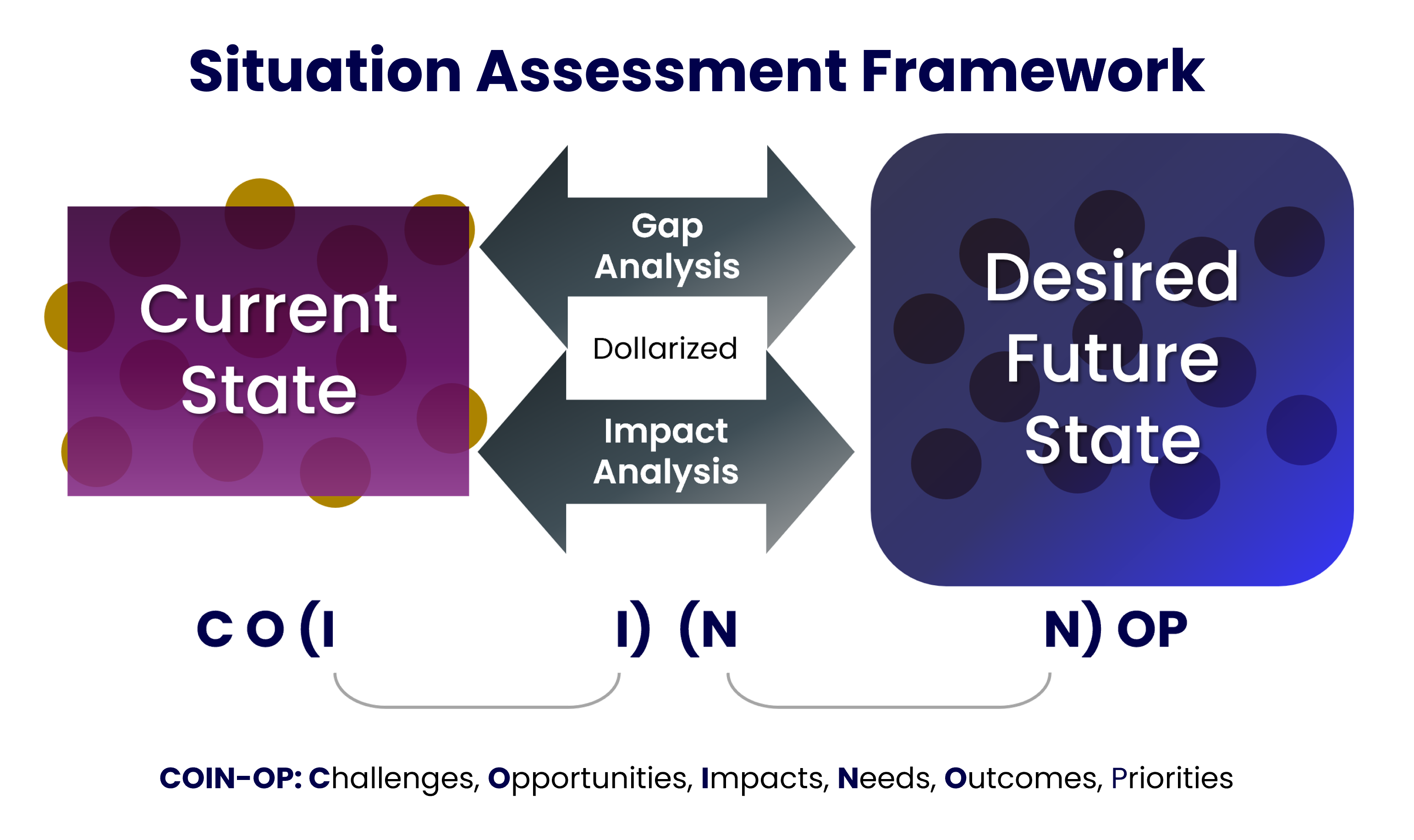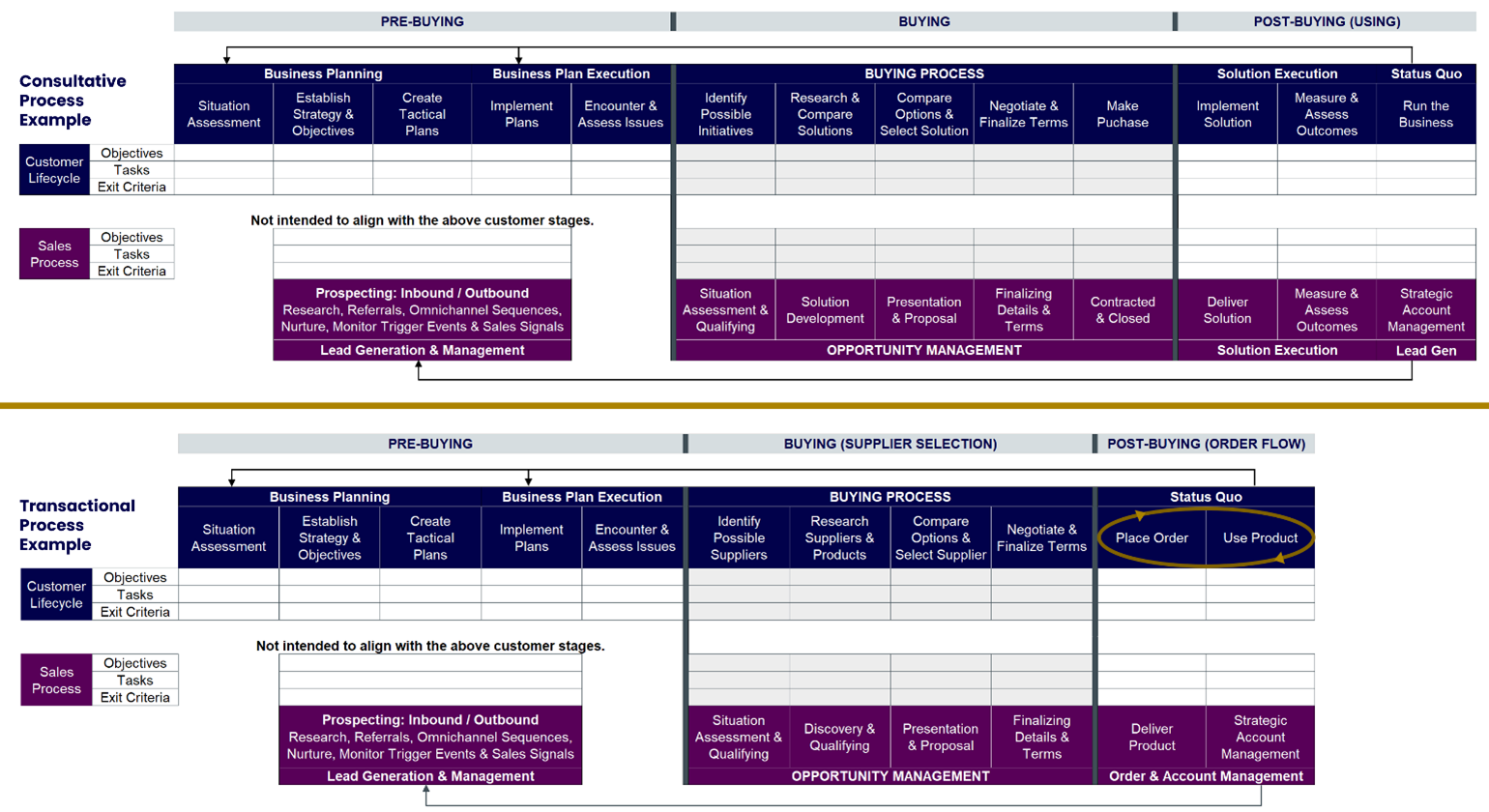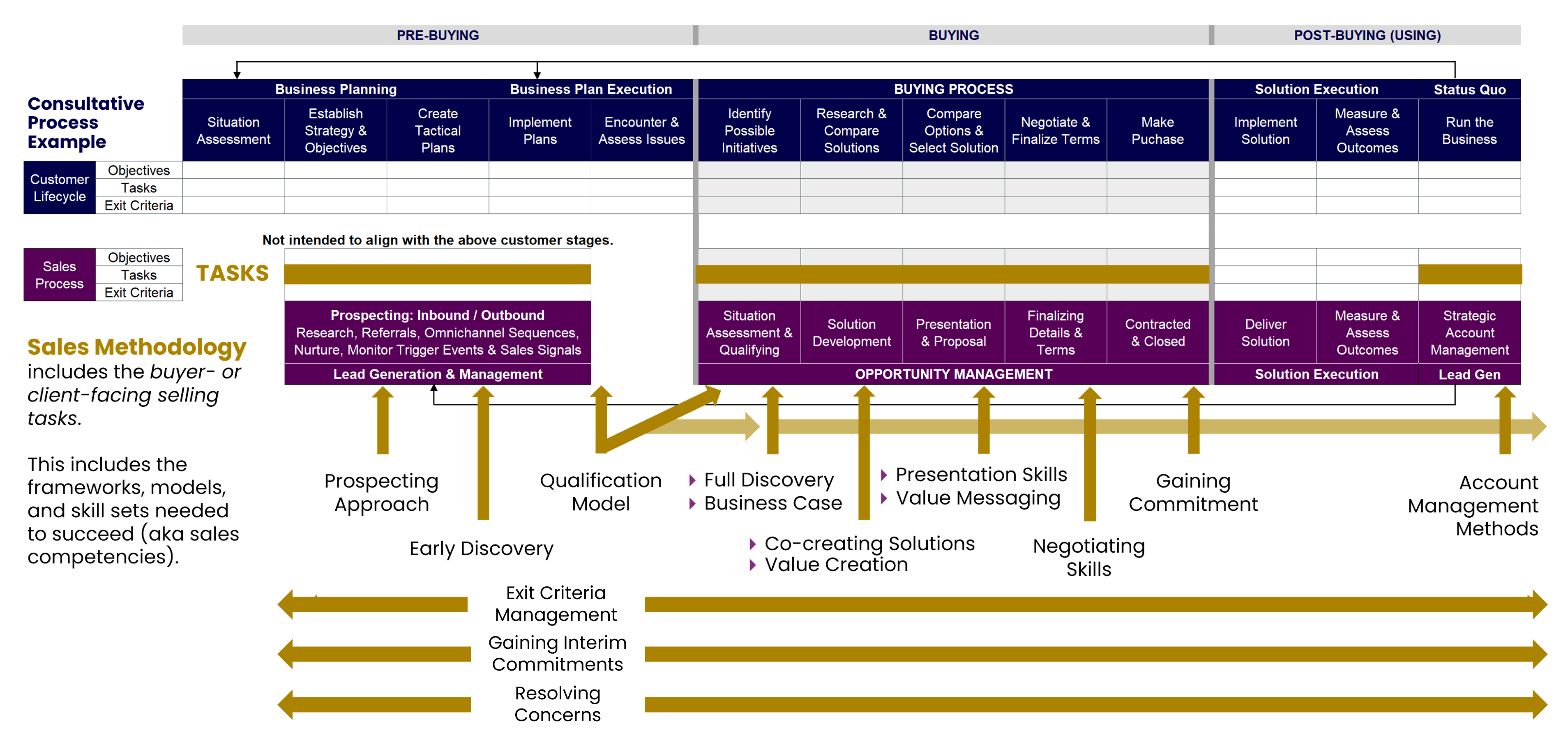Understanding Sales Process, Methodology, and Competencies

Sales process, sales methodology, and sales competencies are all important and related aspects of sales effectiveness. But they are not the same thing.
Why care? Because getting these right, having them support each other, and fostering adoption and mastery, improves revenue plan attainment, individual rep quota attainment rates, and win rates. It’s been proven in multiple studies and is worth the effort.
Sales Process
A sales process is a series of stages that an opportunity moves through. It should be aligned to the customer lifecycle and buying process, where possible. Here are two examples of customer lifecycles and the corresponding sales processes, for a consultative process with an implemented solution, and a transactional process with a flow of purchase, stock, use or resell, and restock.
[click the image to view a larger version]
Every process stage has a name, objectives, tasks that must be performed, and exit criteria – which are the things that absolutely must be done in a stage to close it, before moving to the next. As you can see in the image above, a buying process consists of these same elements – stages, names, objectives, tasks, and exit criteria.
Sales Methodology
Sales methodology refers to the overall approach that sellers use to engage with potential customers, manage the sales process, close opportunities, and manage accounts. The methodology plugs into the process, in the Tasks section. It includes frameworks, models, steps, and techniques that sellers use to open and win an opportunity or manage an account.
A methodology is considered full cycle when it covers everything from before the buyers know who you are, through prospecting, opportunity management, and account management.
[click the image to view a larger version]
By the way, there are literally dozens of commercial methodologies on the market today, but very few that cover the entire customer lifecycle. And a sales methodology includes a qualification model, but a qualification model is not a full sales methodology. I can’t tell you how many times I see confusion about that.
Sales Competencies
Sales competencies, on the other hand, refer to the specific knowledge, skills, mindsets, and behaviors that are necessary for success in a sales role. A competency model is a documented collection of that knowledge, skills, behaviors, traits, and mindsets. There are several levels and elements to competencies. Terminology varies, but this is how I frame it.
[click the image to view a larger version]
Competencies enable the reps to more effectively navigate the process and execute their methodology. Competencies also include traits like curiosity, empathy, drive, and resilience, as well as skills like communication skills (especially questioning skills), relationship building, problem-solving ability, which is not illustrated in the example in the above chart. It also applies to groupings of behaviors, such as prospecting, opportunity management, or account management, with sub-competencies underneath.
Sales competencies are essential for any sales professional, regardless of the specific methodology they use or the process they follow. For example, a salesperson who has strong relationship-building skills – especially trust-building – will likely be more successful in any sales environment, whether they are using Challenger, SPIN, Customer-Centric Selling, Value Selling, or my Modern Sales Foundations methodology. A seller with a growth mindset who is open to coaching with the ability to adapt and learn, will be more successful than someone with a fixed mindset or who rejects coaching.
When many organizations develop competency models and assess their sales force, they often weave both methodology and competencies into the assessment, which they can do, because they have implemented a specific methodology. But the definitions in this post still hold true. These organizations are just combining them.
Using Discovery as an Example
In a similar vein with the combined assessments, Discovery can be a confusing example because it is often a stage name in a sales process, as well as being used to refer to the methodology of learning about the prospect to see if you can help them. In Modern Sales Foundations, we use the term “Situation Assessment,” for that reason. (Well, and because it really is an assessment of the buyers’ situation. See the image below.)
The Process Stage
So, the stage of the sales process could be called Discovery. (The corresponding buying process stage might be Identify Possible Solutions.) This is an over-simplified example for the purpose of this post, but I hope it will be illustrative and helpful.
The objectives in this stage might include:
- Assessing the buyer’s situation to see if and how you can help
- Determining whether the issue is compelling enough to take action and change
- Qualifying whether it is a viable opportunity worth pursuing (even if not fully qualified, for the moment)
- If qualified and compelling, engaging the right buying committee members and scheduling the next meeting (which could be a step, such as deeper-dive Situation Assessment with others, or the next stage, such as moving to Solution Design).
At a high-level, the tasks might include:
- Pre-call research on the account and attending contacts
- Sales call planning and preparation
- Following the steps of the Situation Assessment Framework (the methodology, coming next)
- Qualifying the opportunity
- Sales meeting management
And the exit criteria might include:
- Satisfying the above objectives
- Ensuring a compelling option for the buyers and gaining their consensus
- Ensuring a qualified opportunity, or enough to proceed to further qualify with others
The Methodology
The methodology for Discovery, in this case, would be the Situation Assessment Framework, which includes the current state and the desired future state, where you identify what I call COIN-OP, or the Challenges, Opportunities, Impacts, Needs, desired Outcomes, and the Priorities of those needs and outcomes.
[click the image to view a larger, more detailed version]
Within this framework, sellers still need to research to learn what they can before meeting, prepare insights and perspectives when possible, craft the questioning strategy (flow), the specific questions (messaging), prepare to “peel the onion” versus accepting surface-level answers, and adapt appropriately based on the dialogue.
The Competencies
The sales competencies that would support the Discovery process stage and the Situation Assessment methodology, could include the following traits, mindsets, knowledge, and behaviors.
Traits and mindsets might include things such as:
- Curiosity
- Empathy
- Confidence and professional presence
- Intelligence, or the ability to figure things out quickly
- Resilience or what’s sometimes referred to as grit
- A buyer-centric mindset, where you choose to always operate with integrity in your buyers’ best interests
Knowledge might include things such as:
- Buyer acumen, meaning, an intimate understanding of your market and customers
- Business acumen and financial acumen, so you can speak the language of executive decision makers
- Where and how to research and prepare
- How to craft the strategy/flow of the Situation Assessment and the specific questions to be asked
- And of course, solution acumen – not just about the product, but how it solves the problems that your buyers face and the outcomes it can deliver, when combined with the above business acumen
Underlying skills and behaviors that support executing a methodology might include things such as:
- Interpersonal skills
- Agility and adaptability
- Active listening skills
- Persistence (to “peel the onion,” in particular)
- Trust and relationship building skills
- And especially the ability to formulate and ask open, closed, and targeted questions to detail COIN-OP, and to peel the onion to get to root causes. And, separately, to qualify an opportunity.
And There’s More…
Other skills and models may come into play here during Discovery, as well, such as our ACC model from Modern Sales Foundations, where you Acknowledge, Clarify, and Confirm, or a model for resolving any concerns that may arise. And for each of those models, or methodology pieces, there would be corresponding competencies that would support them, as well.
How to Put This in Context
When I consider all of this, I understand why process, methodology, and competencies might be confusing for some. I get it.
- For sellers, I think about this like it’s an automobile or a watch. You don’t need to know how the watch works to tell time, or how a combustion engine works, to drive a car. You need to be a master behind the wheel.
- For sales managers, I believe it’s helpful to have a basic understanding and to at least know the difference between process, methodology, and competencies. Especially since managers need to develop sales coaching excellence.
But using our analogies from earlier, if you’re a mechanic, or a jeweler who repairs watches, you had better be an expert, right?
- So, if you work as a senior sales leader, or in sales enablement, sales effectiveness, or sales operations, and you want to improve the performance of your sales force, and you’re going to do root-cause analysis, design training, design other solutions, implement process, build or buy a methodology, build systems, assess sales competencies, or help managers coach more effectively, you are deep under the hood of that car, making sure everything is working well to run smoothly and operate at maximum effectiveness.
For you, you need to wade through and master the complexities, to make things work. It’s certainly fine to make things as simple as possible for others – who are just telling time or driving the car, but you – Mr. and Ms. Mechanics of Sales Performance – you need to be an expert.
Closing Thoughts
If you weren’t clear on these distinctions before, or if you were even a bit fuzzy, I hope this post has been helpful. If you’d like to talk about any of these concepts or get some guidance, you know how to find me.
Thanks for reading, be safe out there, and by all means… let’s continue to elevate our sales profession.
Mike
Follow my work and connect
- The Building Blocks of Sales Enablement Book: https://bit.ly/BBofSE
- Sales Enablement Straight Talk Newsletter: https://bit.ly/SalesEnablementNewsletter-Kunkle
- The Building Blocks of Sales Enablement Course: https://GoFFWD.com/Blocks
- Modern Sales Foundations Course: https://bit.ly/MSF-site
- Sales Coaching Excellence Course: https://bit.ly/SCE-site
- SPARXiQ Blog: https://sparxiq.com/author/mikekunkle
- Distribution Strategy Group Blog: https://distributionstrategy.com/author/mike-kunkle/
- Sales Effectiveness Straight Talk Webinars: https://bit.ly/MikeKunkle-OnDemand(60 Free Recorded Webinars)
- LinkedIn Articles: http://bit.ly/MK-LinkedInArticles
- LinkedIn Profile: https://www.linkedin.com/in/mikekunkle
- X: https://x.com/mike_kunkle
- Linktree (All Links): https://linktr.ee/mikekunkle
About Mike
Mike Kunkle is a recognized expert on sales training, sales effectiveness, and sales enablement. He’s spent over 30 years helping companies drive dramatic revenue growth through best-in-class training strategies and proven-effective sales transformation systems – and he’s delivered impressive results for both employers and clients. Mike is the founder of Transforming Sales Results, LLC and works as the Vice President of Sales Effectiveness Services for SPARXiQ, where he designs sales training, delivers workshops, and helps clients improve sales results through a variety of sales effectiveness services. Mike collaborated with Doug Wyatt to develop SPARXiQ’s Modern Sales Foundations™ curriculum and also authored the SPARXiQ’s Sales Coaching Excellence™ course. His book, The Building Blocks of Sales Enablement, is available on Amazon and The Building Blocks of Sales Enablement Learning Experience is available through FFWD.


